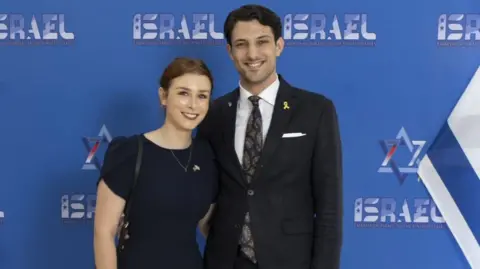The tragic event that unfolded in Washington, D.C., shocked both local and international communities as it involved Israeli embassy staff members, Yaron Lischinsky and Sarah Milgrim, who were shot and killed outside the Capital Jewish Museum. This act of violence occurred following an event that sought to address the escalating Gaza crisis, a discussion aimed at “turning pain into purpose.” Lischinsky, who was mere days away from proposing to his girlfriend, had purchased an engagement ring and planned to pop the question during a trip to Jerusalem.
The violence that claimed their lives reverberated far beyond the immediate surroundings. Eyewitnesses reported that the shooter shouted “free Palestine” just before the fatal act, prompting reactions from Israeli officials who attributed this violence to a rise in antisemitism linked to the ongoing conflict that began with Hamas’s attack on Israel on October 7, 2023. The Israeli ambassador to the United States, Yechiel Leiter, expressed profound sorrow over the deaths, declaring the young couple as a “beautiful pair” who were ready to take the significant step of engagement.
Yaron Lischinsky, 28, and Sarah Milgrim, 26, both deeply embedded in the operations of the Israeli embassy, were celebrated not just for their professional contributions but also for their admirable personal aspirations. Lischinsky had emigrated from Germany, served in the Israel Defense Forces, and held advanced degrees in government diplomacy and strategy. He described himself as having a foot in both Jerusalem and Nuremberg, seeking to foster peace and understanding among diverse communities. Friends described him as a “calm and friendly” individual with a passion for reconciliation between Israelis and Germans.
Conversely, Sarah Milgrim had demonstrated her dedication to peace long before this tragedy. She had invested her summers working collaboratively with Palestinian and Israeli groups, showing a strong commitment to humanitarian efforts across borders. Her involvement with organizations such as Tech2Peace illustrated her passion for advocacy and her hopes of creating dialogue and understanding. Her father, Robert Milgrim, recounted how much Sarah cherished her activity, which brought together individuals from both communities and cultivated friendships across cultural lines.
The aftermath of this shooting not only marked a profound loss for Lischinsky and Milgrim’s families but also signaled a broader reckoning regarding rising violence and its consequences amid ongoing geopolitical tensions. The Israeli embassy expressed that all staff members were “heartbroken and devastated,” underscoring the impact this loss had on those who worked alongside the couple. Furthermore, in light of the shooting, heightened security measures were implemented at Israeli diplomatic missions globally, an indication of fears surrounding increasing hostility.
This incident is particularly poignant against the backdrop of the Gaza conflict, now in its nineteenth month since the Hamas-led assault, which has claimed thousands of lives and exacerbated an already dire humanitarian crisis. Reports indicate that Israeli military operations in Gaza have resulted in substantial civilian casualties, drawing international scrutiny and concern. Aid organizations, along with various governments, are sounding alarms about the looming humanitarian catastrophe, with dire predictions of famine affecting countless individuals.
In the midst of these chaotic circumstances, Elias Rodriguez, a 30-year-old from Chicago, has been taken into custody as a suspect in the murders of Lischinsky and Milgrim, with investigations ongoing. The implications of his actions resonate deeply within the larger narrative of conflict and hostility, triggering conversations about the state of safety, peace, and understanding in regions deeply marred by violence and division.
The tragic deaths of Yaron Lischinsky and Sarah Milgrim serve as yet another reminder of the human cost of conflict. Their hopeful futures, marked by aspirations for love and peace-building, were violently interrupted, igniting calls for reflection on how societies can come together to foster cooperation and compassion in tumultuous times.



